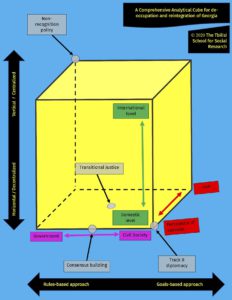Op-ed by Giorgi Arziani
Protracted occupation of Georgian territories has caused a sort of depression, which manifests itself in a peculiar intellectual paralysis: many do not see any possibility to turn things around and find refuge in abstract thinking about a better future. A vivid example of such inability to deliver a rational response to the occupation of Georgian lands and a split in our societies is the benevolent dream that someday borders will no longer exist, conflicts will fade away, and freedom of movement will come without any legal friction.
In fact, this narrative is as impractical as it is risky; it is infused with laziness of imagination, and only reinforces the defeatist attitude towards the injustices and hardships brought to our communities by an unauthorized foreign military presence. The inability to see an opportunity for Georgia to revive territorial integrity is framed by the subjective feeling that time brings only negative changes and the younger generation turn numb to the problem.
However, contrary to such interpretations, time only further reveals the disturbance of Russia’s imperial policies, while younger generations are coming into power and rejecting the impotence of those who came before them. In fact, the grievance against occupation and lost communities is undergoing a revival, suffice it to recall the growing number of fiction, art, news media outlets that attract active public engagement even in such an extremely saturated media environment, or the growing number of articles produced in academia and by think tank influencers. The absolute majority of this output is created by younger generations. More than that, many young Georgians collaborate in rapidly growing grassroots communities in an effort to pave a way out of the bad equilibrium brought by Russian occupation.
Instead of futile daydreaming, they employ methods of scientific anticipation and strategic thinking about
alternative future scenarios.
One such idea, created by yours truly, is a comprehensive analytical cube that systematizes the issues of de-occupation and reintegration of Georgia under one framework. It schematically unites five properties and characteristics (dimensions) of any activity that can be executed. It systematizes the answers to the following questions: who, government or civil society, should be responsible for activities aiming at de-occupation and reintegration of Georgia; at what level, international or domestic, should these activities be executed; how these activities should address the gap between the internationally acclaimed legal norms and the conflicting perceptions of historical fairness; should these activities be centrally organized or decentralized; and, an insight borrowed from the financial markets regulatory approaches, what regulatory models should be used: a rules-based or goals-based approach.
The choice of a specific regulatory model influences the incentives and allocation of risk, and has important implications for the coordination of actions between numerous governmental and non-governmental actors. The distinction of the models is that a rules-based approach is rather prescriptive and provides the actor with exact guidelines for the actions, while a goals-based approach is more flexible, as it focuses rather on the outcome, while leaving broader discretion with regards to the means of the actor. The scheme is illustrated by several examples that aim to make it easily understandable. The idea behind this analytical cube is to formalize our thinking about the most pressing problem of Georgia and assist with the intuitive visualization.
What differentiates these new grassroot communities from previous generations is that they reject the so-called ‘new reality,’ and their work is empowered by one insight: the chance for the de-occupation of Georgia will inevitably come, however, one should be ready to take the chance. The future does not simply happen: it is created; allies will help, but there is work that should be done by us, and, to my joy, I see that a new generation is coming into power, a generation that has a vision, has power and has will.















